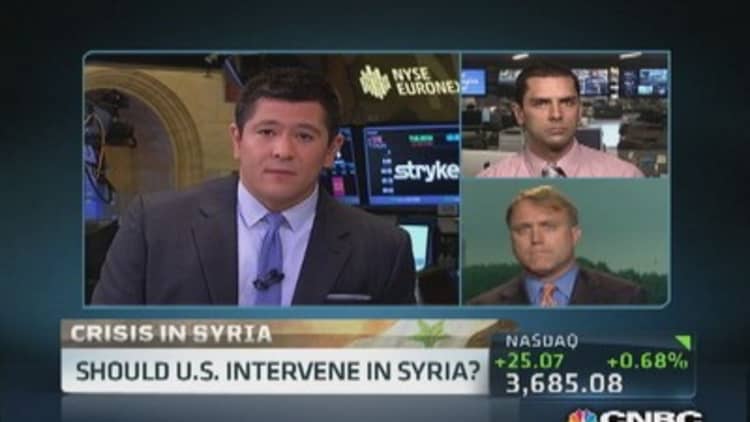Russia proposed on Monday that Syria hand over its chemical weapons to international control in an attempt to avert a U.S. military attack.
Sergei Lavrov, the Russian foreign minister, told reporters that he had conveyed the idea to Syria at talks in Moscow and expected "a quick and, I hope, a positive answer." Syria publicly welcomed the idea, but a senior White House official told NBC News that it was no more than a delay tactic.
Russia is an ally of Syria, and Russian opposition is one reason the United States is not working through the United Nations to build support for a strike to punish the Syrian regime for using chemical weapons in its civil war.
More from NBC News:
Obama legacy on the line as Syria vote looms
Don't expect jobs, wages to grow any faster, economists say
Now it's the 43 percent: Fewer households paying no federal income tax

Secretary of State John Kerry said earlier in the day that Syrian leader Bashar Assad could avoid an American attack by surrendering his chemical weapons within a week. But he said Assad would never agree to it, and a spokeswoman later said Kerry was speaking rhetorically.
"His point was that this brutal dictator with a history of playing fast and loose with the facts cannot be trusted to turn over chemical weapons, otherwise he would have done so long ago," the spokeswoman, Jen Psaki, said in a statement. "That's why the world faces this moment."
The senior administration official told NBC News that Russia was only trying to protect the Assad regime and that the United States would make decisions about a military response "on our own timeline, period."
(Read more: Kerry: Syria can still avoid a military strike)
President Barack Obama will address the country Tuesday night to press the case for an attack. The administration says it has overwhelming evidence that Assad's forces used nerve gas to kill 1,400 people, including more than 400 children, in an attack outside Damascus on Aug. 21.
The Syrian foreign minister, Walid al-Moualem, accused Obama of backing terrorists and invoked Sept. 11. Sunni Muslim extremists allied with al Qaeda are among the rebels fighting to overthrow Assad, a member of the Alawite sect, a Shiite offshoot.
"We are asking ourselves how Obama can ... support those who in their time blew up the World Trade Center in New York," said at a press conference with Lavrov, his Russian counterpart, in Moscow.
Lavrov said there was enough evidence to show that the rebels fighting Assad have chemical weapons themselves.
Russia, one of Assad's staunchest supporters, continued its call for a political solution to the crisis, which has claimed 100,000 lives, displaced close to a third of Syria's population and destabilized the region.
(Read more: Retail investors shrug off fears of Syria, Fed taper)
The al-Moualem-Lavrov press conference contrasted with another impassioned statement in support of military action against Assad's government by Kerry, who said that Syria and its close ally Iran had admitted there was a chemical attack but blamed it on others.
"We see people dying, children, young kids not old enough to even speak, heaving for breath," he said during a press conference with British Foreign Minister William Hague in London.
"If we don't stand up to it, we will face it more, and they will think they can intimidate anybody," he said. "The risk of not acting is greater than the risk of acting."
Assad has steadfastly rejected he was behind the gas attacks. In an exclusive interview with journalist Charlie Rose, Assad "denied that he had anything to do" with the chemical weapons attack last month, according to CBS News.
The U.S. says it has overwhelming evidence that the lethal nerve agent sarin was used near Damascus and that 1,429 people died, including 426 children. The British-based Syrian Observatory for Human Rights, which collects information from a network of anti-government activists, says it has been able to confirm 502 dead.
Obama was scheduled to record a slew of interviews on Monday, the first day Congress will be in session since an August recess. Syria debate could begin in the full Senate this week, with voting as early as Wednesday. The House may take up the issue this week.
(Read more: Will Syria keep Larry Summers out of the Fed?)
Foreshadowing the president's message to Americans in a rare prime-time address planned for Tuesday, White House Chief of Staff Denis McDonough told "Meet The Press" that "nobody is rebutting the intelligence; nobody doubts the intelligence" that is the basis for pinning the blame for the chemical weapons attack in Syria on Assad's regime.
"Our troops have not been subject to chemical weapons attacks since World War I," he said. "We have to make sure that for the sake of our guys—our men and women on the front lines—that we reinforce this prohibition against using chemical weapons."
Despite these assertion, Obama faces an uphill battle convincing Congress as well as the international community to back the attacks.
He will have to convince skeptical lawmakers to approve limited bombing strikes against Assad and rally a war-weary American public to back yet another military action in the Middle East.
—By Albina Kovalyova, F. Brinley Bruton and Erin McClam, NBC News. Peter Alexander of NBC News contributed to this report. Reuters and The Associated Press contributed to this report. F. Brinley Bruton reported from London and Erin McClam from New York.

